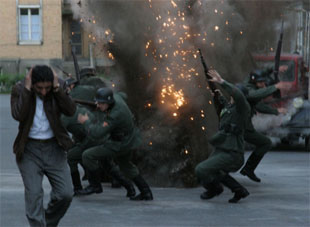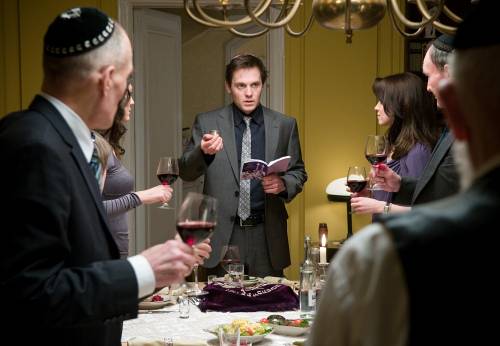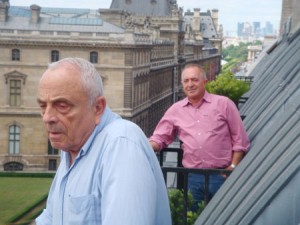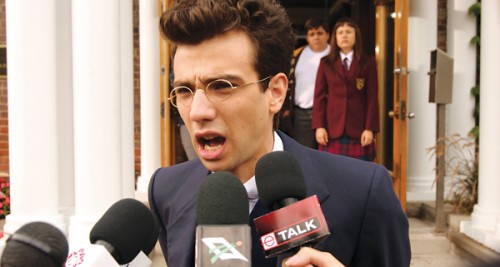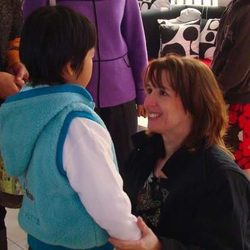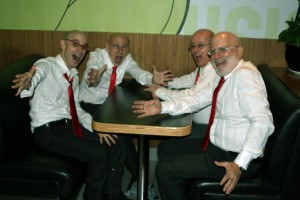Short Film Reviews: A Focus on The Boston Jewish Film Festival [2x Updated]
And so I go, Jewish and glad to be, theatre director—maybe between gigs, old enough to believe that movies are best on the big screen among other (quiet) viewers and that you don’t have to be Jewish to love good Jewish movies.
By Joann Green Breuer
The danger of speaking critically of any ethnic art is that it may be interpreted as saying something negative about the ethnicity that’s the subject of the art. It ain’t necessarily so. And usually isn’t.
Another danger for a critic is feeling an obligation to support an art because it deals with one’s own or favored ethnicity. But criticism should not be a form of affirmative action because it would result in a distrust of art itself. Of course, a festival increases the stakes. It is expensive, extensive, and advertised as exemplary. Of course, there is always hope, and hope is sometimes even fulfilled.
So we go, we support, we hold our tongues more than we lash out, we desperately want to say good things and say them well. And so I go, Jewish and glad to be, theatre director—maybe between gigs, old enough to believe that movies are best on the big screen among other (quiet) viewers and that you don’t have to be Jewish to love good Jewish movies.
Sara Rubin, the artistic director of The Boston Jewish Film Festival, defines a “Jewish movie” as one on “Jewish themes,” whatever they are. She does not demand a Jewish writer, director, or Jewish cast.
At the close of the Festival, when I have seen almost all of the films, I will speak of what the Jewishness of the Festival films may be. For the moment, let’s assume that such ethnicity is evident and unique. Whether Jewishness is of artistic value, necessity, substance, or makes any difference in the evaluation of cinematic artistry is an argument on which I have yet to take sides. But, I dare say, I will.
MAYA, fiction
Director: Michal Bat-Adam, Israel
(Chosen as the opening film of the Festival)
What might have been a terrifying vision of a director’s nightmare, delivered via a play-within-a-film, instead becomes film director/writer/teacher Bat-Adam’s self -serving script. The actress in the play at the center of the movie does it her way, Stanislavski-to-the-nth, spending days in a mental hospital disguised as patient. For me, her performance becomes increasingly indulgent, intrusive, indolent, and imitative. The play’s director/writer within the film takes a more metaphoric albeit clichéd view of mental illness ( they suffer but are tantalizingly wise . . .).
The play’s director learns his theatrical lessons once he ultimately sees that the inexperienced actress, with whom he falls immediately in love and with whom he is already sleeping, has been right all along. Thus Maya’s director Bat-Adam makes sure we see how perceptive she is.
I would have wished for more metaphor and less meaningfulness. For the record, the actress in the role of the play’s stage manager, though she had only a few lines, captures with minimalistic aplomb both the character’s unrequited idealization of the handsome, fictional play director and the pressure of her job.
OH, WHAT A MESS!, fiction
Director: Dirk Riegel, Germany
It may be German made, but this is Hollywood-ish at its sentimental best, its light underplay of unresolved anti-Semitism giving bite to an otherwise predictable if pleasant kiss. Mixed couples, sexual and religious, gain, lose, and—dare I give it away (guess . . .) in this made-for-TV film. It holds the big screen, though it left some of the observant Jews in my audience fretting. But no real controversy here—this is political correctness leavened.
Terrific acting saved scenes filled with admittedly sketchy and stereotypical characters in both the Jewish family and the non- Jewish family. Also easy to take was a rousing musical score of familiar, beloved, primarily American popular classics, and lively, unobtrusive camera work. The goyishe hunk at the yiddishe tisch is a tasty eyeful to boot.
PARIS RETURN, documentary
Director: Yossi Avriram, Israel ( in French mostly)
Two gay and aging long-time partners, both architects (at home, one is a cook, the other a collector), plan to leave Paris and their pots and pans and precious possessions to end their lives in Israel. They may be going somewhere, but this film isn’t.
THE TROTSKY, fiction
Director: Jacob Tierney, Canada (Quebec, in English)
When was the last time you heard the Soviet Army Chorus?
Their resonant and thrilling bassos boost this sweetly sincere, persistent fantasy—or is it real? A teenage Montrealer, willowy, wire-framed, and bespectacled, believes himself to be the re-incarnation of Leon Trotsky. He calls for strikes, first in his father’s humanely run factory and then in his less humanely structured public high school.
The genre is of the cartoon, high school drama variety, nerd vs jock, but here the nerd is ultimately the leader and despite his absurdly idealistic belief, we root for him and maybe even want to believe. Jay Baruchel as Leo Botstein is a determined charmer. For those, probably past their own teen ages, who remember who Trotsky, Lenin, and Stalin were, not to mention their own high school tsurises, the nostalgia has its contagions.
THE “SO-CALLED” MOVIE, documentary
Director: Garry Beitel, Canada (Quebec, in English)
Socalled is a prolific poly-aesthete/artist and more than one experience at once. Musician, magician, cartoonist, composer, collector of sounds as music, music as sound, audience favorite, compassionate, irreligious, irreverently respectful, continuous prodigy, and prodigious performer. You really do have to be there.
The reels that make up this documentary seem to be a series of YouTube clips, tantalizing teasers rather than a full feature. Socalled is still young. As is his audience. For now and for them, a short attention span may be appropriate. I look forward to a long future of this amazing Canadian and a more leisurely, lingering conversation and concert with him.
ARMY OF CRIME, fiction
Director: Robert Guediguian (France)
Missak Manouchian, Armenian poet and partisan, is the central figure in this fictionalized story of resistance in Paris, 1943.
Armenians, Hungarians, Bulgarians, Jews and non-Jews, mostly Communists, all fervently anti-Nazi, slip among the streets, compelled by personal friendship, political fervor, love, and duty, printing their affiches to actions, pulling triggers, protecting each other, doomed (as we are told in the film’s first frames) as they probably know they are.
Nazis are killed cleanly, immediately. Partisans are tortured slowly, vividly, agonizingly. There is a moment when the great poet, elegantly enacted, questions the ethics of war: should murder beget murder? The issue is soon dismissed in a swell of patriotic passion. There are no doubts here as to who are the good guys, the hell with their actions—war is hell. The rich score, occasionally moving and relevant, serves as a redundant echo of the bloody, fiendish sights of torches searing anti-Nazi chests. Not for the faint- or pacifist-hearted.
I LOVE YOU MOMMY (documentary)
Director: Stephanie Wang-Breal (China, USA)
Don’t be fooled by the opening shots of chubby, well-padded Chinese toddlers tumbling adorably down an s-slide, their rosy cheeks, cupped hands, knees, and kishkes landing in soft sand or extended arms. Don’t be fooled by the next shots of Chinese adults, intently carving their slow motion tai chi moves in the Guangzhou early morning open air. Ms Wang-Breal knows a cliché when she uses one, and she uses one with good reason.
To her credit, she quickly peels away cinematic clichés. What follows exposes with a clear-eyed honesty rarely documented on film the complex values of family slips, stress, and stick-to-it-tiveness. This film is as tough as it is tender, as much about loss as it is about love.
A well-to-do Long Island Jewish family adopts an eight-year-old Chinese girl whom they have already named, without irony, Faith. It isn’t easy. Landings are not always soft, not in America, nor in a new mother’s lap. This mother, like the film itself, is wiser than she is wrong, more persistent than most, more to be watched than judged.
This is ultimately a beautiful movie, more compelling and touching than any family values cliché. Adoption, foster family, racism, sibling connections, disability, language, and Judaism — these and other challenges shape, disrupt, and enrich these lives, despite what looks to be, on the surface, a Jewish “Life of Riley” complete with swimming pool, playroom, playthings, extra curricular activities galore, and an extended passel of welcoming relatives.
Mid film another cliché is burst. Faith questions her adoptive mother’s embrace at their first meeting. “How could she say she loves me,” Faith asks. “She didn’t even know me.” Uh oh. We realize we, the audience have been caught in our own wish-fulfillment cliché. Amazingly, by now, we do, and we do.

THE LONERS: A macho buddy movie with two superb performances by its amateur leads. Photo: IsraeliFilms
THE LONERS (fictionalized actual events)
Director: Renen Shorr (Israel)
In contrast to the opening film in the Festival, Maya, the pair of amateur actors who have the leads here have the artistic strength to carry it. Essentially, this is a macho buddy film, one guy a misguided but sincere leader, a good shot aimed at an off-target ambition, the other his too long loyal liege, all big ears and wide eyes, with obvious blind and deaf spots.
These two Russian immigrants were serving in the Israeli army when they were accused and convicted of the wrong crime. Of course, they want out, via a retrial of their case. They are not traitors, but they are disastrously naïve. Oddly, the guards of their prison are slack, the security questionable, the warden’s office accessible. I would have thought Israeli prisons were more secure than this one, and the guards more alert.
But then this would have been a different story. These events, or something like them, did occur. The action in the film, as instigated by the buddies, is violent, bloody, brutish, battering, and pervasive. Their back stories and motives are bluntly, told rather than enacted. But the narratives are so well expressed by these two born actors that we do not demand more. We hear, accept, and move on to the next torture incident. Professionals play the good guys, who are just following army orders. They rarely match the buddies’ believability in terms of their performances, but that may be because the script doesn’t give their characters any depth.
There is one female in the film and, unfortunately she is put into embarrassing postures. Her moment of feminine empathy feels obligatory.
Yet the film works. It works because the buddies’ desperate blend of determination and doubt never falters. Shorr uses close-ups frequently. The expressiveness of the leading duo belies their sadistic cruelty. Their faces bear marks of desperation and pathos. We do not cease to wonder how all this will end, and wonder how we are made to care so much.
TANGO, A STORY WITH JEWS (documentary)
Director: Gabriel Pomeraniec ( Argentina)
It’s the director’s first feature documentary. That may explain it, but it does not excuse it. Stock footage of ships entering a harbor, a listless list of undifferentiated Argentinian and Argentine immigrant names and faces of mostly dead accordionists, pianists, composers, phony interviews ( pre-written, mostly read), occasionally an artsy shot cut among a series of frustrating introductions, this continuous musica interrupta offers little tango, no story, some Jews. Dance instruction: take two quick steps back, out of the theater.
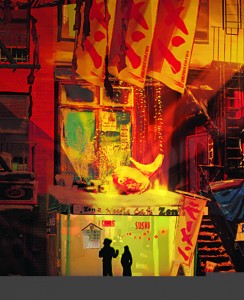
Poster for HASAN EVERYWHERE — the animated film explores the conflict between an Israeli woman and her Arab lover.
ME AND THE JEWISH THING (documentary)
Director: Ulrik Gutkin (Denmark)
HASAN EVERYWHERE (animation)
Director: Andrew Kavanagh (Ireland)
MICHAL, MATTHIAS, AND THE UNBORN CHILD (documentary)
Director: Michael Oppenheim (Germany)
A trio of short films, explorations of interfaith marital issues, shown sequentially.
The first is the most thoughtful, but all three suffer the same fault: problems are resolved not by the protagonists, but by fate, so whatever their struggle with issues has been is rendered moot. We have wasted our time worrying. We are cheated.
The ME in the first film is Jewish, wanting, but not able to understand or sufficiently communicate, why he wants to have his son circumcised. His wife, Christian, finds the procedure unnecessarily painful as process, and a life-long statement-scar. Both arguments make emotional sense, at least to each of them, and feel intractable. Will the marriage survive? Will the foreskin survive? Thank God, if you wish, the problem is removed. Until then, however, the fifty minute film is engaging and troubling. The filmmaker’s terrific use of music and silence, freeze frame, and leitmotif of momentary recurring ritual, gives particular aural and visual punch to the increasingly stubborn arguments, and the couple’s deepening attempts to connect to a Judaism with which they can live comfortably.
HASAN EVERYWHERE is an animated seven minutes of barely comprehensible dialogue (thick accents) between an Israeli woman and her Arab lover. Politics, let alone the necessity of personal decisions, are swept away in a wave, an actual water wave. Too many broad strokes of animation brushes and swimmer arms do not save this film or this couple’s future. It’s a facile end to what they keep telling us is a love story.
Michal and Matthias have already made their decision before this twelve minute film begins. She will leave Israel to live in Berlin. Neither I nor the film gives anything away by letting you know that there are Jews living in Berlin.
RELIGION.COM (documentary)
Directors: Ron Ofer, Yohai Hakak (Israel)
THE WORST COMPANY IN THE WORLD (documentary)
Director: Regev Contes (Israel)
A pair of films about Jewish run commercial enterprises.
Yigal Revach had yearned to become, and still wishes he were, an Orthodox rabbi. Instead, he is running a computer-based advertising agency in B’nei Brak, an ultra Orthodox Jewish community. The local rabbi fears contamination by whatever the internet carries. The conflict seems to be between Yigal and the local rabbi, tradition barricading against the onrush of modernity.
But the conflict which gives this film its energy is the one within Yigal himself. He earns his earthly living, but then he must purge his eternal soul. And then he will continue to earn and purge, a wheel of fire of his own diametric ambitions. As in the interfaith family films shown earlier, one conflict is resolved by outside force. However, here the inner conflict remains, restless and biting. The camera rattles, the dialogue is almost too rapid to follow, street sounds disrupt thought processes. This is not a pretty film, nor should it be.
The companion film purports to be a comedy. The son of a supremely lackadaisical owner of an insurance company, the ‘worst in the world,’ decides to help his father, his uncle, and their friend out of near bankruptcy and office chaos. The son is a professional advertising filmmaker, but his technique here is all hand held camera job, self conscious amateurism.
There are cute scenes: cat and coffee cup, constant shredding and re-shredding of unimportant papers, funny hats, long naps. Yet this so-called comedy soon diminishes into impotence, almost pathos. Love among the men feels real, until one is fired with no consequences. He returns eventually, but also with no consequences. Fifty minutes of passivity on the subjects’ parts does not merit the same by their audience.
Tagged: Army of Crime, Boston Jewish Film Festival, Culture, Jewish, Maya, Oh What a Mess, Paris Return, The So-Called Movie, arts


